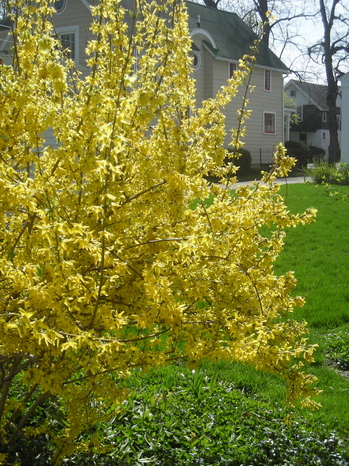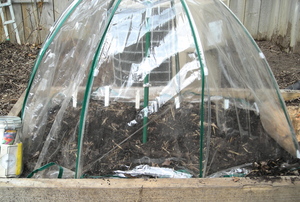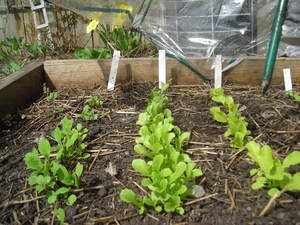Highlights from my Master Gardener class, a pause before volunteering

I learned in my Master Gardener class that forsythia bloom when the temperature of the earth has been 50 degrees for 10 days.
Corinna Borden | Contributor
Then you have communicated with the legions of MSU extension Master Gardener [MG] volunteers.
Last week we finished our 12 classroom lessons, and the second half of the class focused on the myriad opportunities available in the community to complete our 40 hours of volunteering necessary to become certified.
Presentations were given by over 20 people outlining ways in which we could help in the community. The formal native plant garden (recreating original prairie conditions) at the Furstenberg Nature Center has MG volunteers. Volunteers help with the controlled burns Ann Arbor does to reduce invasive species in the parks.
The 4-H Junior Master Gardener Program is run by MG volunteers. Open to all 9- to 11-year-old residents of Washtenaw County, the six-week class covers soil, plant science, vegetables, yards and garden pests, flowers and woody plants and lawn. The class has a 10 hour volunteer component to “help kids discover that gardening is a fun activity, and volunteering is an important part of being a good citizen in the community.” If you are interested, contact Cindy Fischer, 734-222-3948. From my own experience with the adult class, it sounds like a wonderful time.
As I look over my notes from the adult class, I feel in awe of the knowledge, devotion and excitement of my teachers. Here are some of the highlights from the 12 weeks of class that particularly stick with me.
From Plant Science
“The only thing to worry about with plant cells is whether the temperature goes below 28 degrees. The rigid cell wall breaks open with the expanding water.” This is why this year I have rarely watered my lettuce seedlings growing outside under plastic; we will see what happens.

I planted my lettuce under plastic in mid March and have watered them once since then.
Corinna Borden | Contributor
“Plants grow at nighttime; they use the sunlight and build tissues at night.” This is why nighttime temperatures are so important for ripening tomatoes - a good reason to cover with plastic.
“Apples emit ethylene gas - a hormone that causes ripening.” Now I know why people keep their apples in a separate bowl on the counter away from the other fruit.
From Soil Science
“Fertilizer burning happens when the excess salt pulls the water out of the roots - dehydrating the plants.” Ah ha! The term “burn” explained.
From Tree Fruit
“No matter what you do to augment the soil, it will return to its native state in three to five years.” This is a good motivator to keep on pouring compost tea on our vegetables every year and continue to mulch.
“Honeybees come from Greece. Bumblebees are native and sit on their eggs like a chicken,” What a fascinating image.
From Household Pests
“The flour sifter was originally invented to sift out bugs,” and to continue the history lesson, “in farms, the pig tail with fat attached was kept to grease the pans - you would hold the tail and rub the pan.” Think of that next time you reach for the Pam.
“Wasps don’t have night vision. Don’t spray them during the day. Creep up without a flashlight and hit the nest with a full can of insecticide at night.” Your skin will thank you.
From Plant Health Care
As I discussed in my full article, resistance to pesticide will happen, the “goal of Integrated Plant Management is to slow this development.”
From Indoor Plants
Transplanting plants into pots that are too big is a problem because there is “too much moisture in the soil for the plant to use. You only want to go up to a container 1-2 inches wider.” I did not know this rule when I transplanted my jade plants - so now I water them rarely to make up for my original misstep.
From Small Fruit Culture
“Bugs have a hard time feeding on a healthy plant because the sap pressure is so high it is like feeding from a fire hose.” Reminds me of the Gary Larson cartoon of the mosquito hitting an artery.
From Woody Ornamentals
“Eight-five percent of the time, the soil is the reason why bugs and diseases develop.” Yet another good reason to do a soil test, “because once the tree is in the ground, it is too late.”
From Lawn Turf Class
“Turf is a $1.8 billion industry in the United States.” To give you some perspective, the GDP of Haiti in 2008 was $6.95 billion.
“Leaving grass clippings on the lawn replaces one application of nitrogen fertilizer and does not contribute to lawn thatch. The only way to ameliorate lawn thatch is to use an aeration machine to core the soil, introducing air which allow in microorganisms which will eat and reduce the thatch.”

The height of the barely watered lettuce, a month later.
Corinna Borden | Contributor
From Composting
“Anywhere from 17 to 24 percent of Michigan solid waste can be composted.” I worked with landfills, and I don’t think that is a permanent solution to our waste needs. So, until the day that we figure out a better system, putting less trash into landfills seems to be a worthwhile endeavor, especially since composting can be very easy.
I utilize the “cold composting” method, which involves dumping our kitchen scraps (no protein), grass clippings, etc. on a pile and turn once a year. The important ratio is two parts brown to one part green in order to have the right carbon to nitrogen ratio.
Another wonderful element in the Master Gardener Class was the student sharing. One student shared in the compost class that her neighbor lost a house from storing grass clippings inside trash bags in the garage, and they burst into flames. A former firefighter in the class shared that leaves kept in a black trash bag can cause spontaneous combustion from steam forming and super-heating the grass. This is why farmers do not roll and store wet hay.
As I scratch my head over the many volunteering options, I am so glad I participated in this wonderful program offered to us as residents of Michigan. Though the formal learning is complete, I know this is the beginning of my Master Gardener experience.
Corinna works with the Westside Farmers Market and writes about many things.

